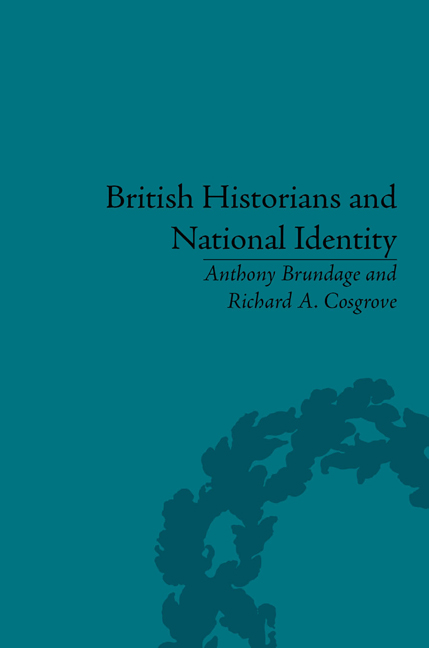Book contents
- Frontmatter
- CONTENTS
- Dedication
- Acknowledgements
- Introduction
- 1 Demythologizing the Nation's Past: David Hume's History of England
- 2 Catharine Macaulay's Vindication of Radicalism and the Republican Tradition
- 3 Reassessing Religion and the National Narrative: John Lingard and the English Reformation
- 4 Placing the Constitution at the Heart of National Identity: Henry Hallam and Constitutional History
- 5 Thomas Babington Macaulay: Writing the History of a Progressive People
- 6 The Glories of the Reformation and the Origins of Empire: J. A. Froude's Celebration of the Tudor Era
- 7 Edward Augustus Freeman: Liberal Democracy and National Identity
- 8 William Stubbs: The Continuity of English History as National Identity
- 9 Celebrating the People: J. R. Green's Short History
- 10 Samuel Rawson Gardiner: Incorporating Dissent into the National Story
- 11 In Thrall to English Tradition and Character: G. M. Trevelyan's Panoramic Histories of the Island Race
- 12 The Anglosphere as Global Model: Winston Churchill's History of the English-Speaking Peoples
- Conclusion
- Notes
- Works Cited
- Index
3 - Reassessing Religion and the National Narrative: John Lingard and the English Reformation
- Frontmatter
- CONTENTS
- Dedication
- Acknowledgements
- Introduction
- 1 Demythologizing the Nation's Past: David Hume's History of England
- 2 Catharine Macaulay's Vindication of Radicalism and the Republican Tradition
- 3 Reassessing Religion and the National Narrative: John Lingard and the English Reformation
- 4 Placing the Constitution at the Heart of National Identity: Henry Hallam and Constitutional History
- 5 Thomas Babington Macaulay: Writing the History of a Progressive People
- 6 The Glories of the Reformation and the Origins of Empire: J. A. Froude's Celebration of the Tudor Era
- 7 Edward Augustus Freeman: Liberal Democracy and National Identity
- 8 William Stubbs: The Continuity of English History as National Identity
- 9 Celebrating the People: J. R. Green's Short History
- 10 Samuel Rawson Gardiner: Incorporating Dissent into the National Story
- 11 In Thrall to English Tradition and Character: G. M. Trevelyan's Panoramic Histories of the Island Race
- 12 The Anglosphere as Global Model: Winston Churchill's History of the English-Speaking Peoples
- Conclusion
- Notes
- Works Cited
- Index
Summary
A national narrative expresses a country's exceptionalism, recounts its history in salutary fashion and both appeals to and generates patriotism in its citizenry. In the current curricular debate in the United Kingdom, the Royal Historical Society posed the challenge that all history teachers face: ‘Should the History curriculum provide students with a greater sense of a national narrative or should the teaching of history focus on gaining skills and understanding concepts?’ These objectives are not mutually exclusive, but the query pertains to the crux of what history instruction should envision and how this relates to the way the past is remembered. The English national narrative, in part due to the efforts of historians discussed in this work, blended patriotism and social stability by 1950: ‘During the first half of the twentieth century, English history was widely regarded as an exemplary narrative of achievement, heroism and sacrifice’. As appealing as this depiction became, discourse about the English past was never this simple and always contested. Just as the English past defined national greatness for some, it also caused anxiety for others who worried about decline from an idealized history.
One major topic within the tradition of specifying national identity drawn from the past concentrated on the English Reformation. Whether regarded as an event or a process, the transition from a Catholic to a Protestant nation helped to define national identity.
- Type
- Chapter
- Information
- British Historians and National IdentityFrom Hume to Churchill, pp. 43 - 54Publisher: Pickering & ChattoFirst published in: 2014

